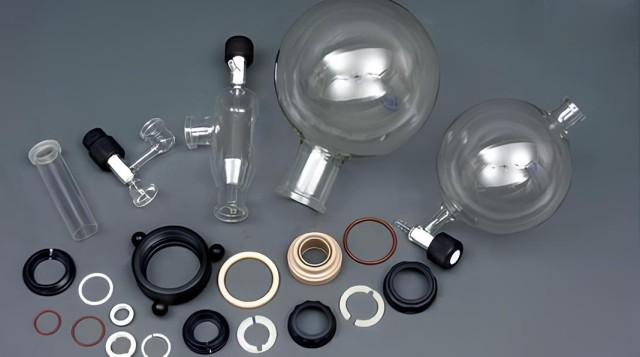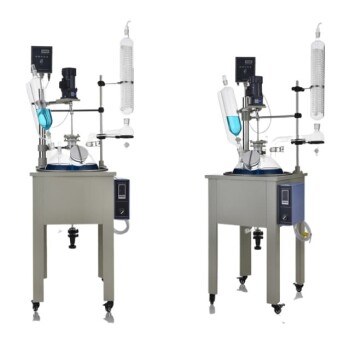Introduction to Rotary Evaporators
Rotary evaporators are commonly used in laboratories to separate solvents from a mixture through the process of evaporation. The process involves heating the mixture in a flask, rotating it to increase the surface area, and then drawing off the vapor into a condenser. The condenser cools the vapor, turning it back into a liquid that can be collected. Rotary evaporators are widely used in the chemical, pharmaceutical, and biotech industries for various applications, including solvent removal, concentration, and purification. These devices come in different sizes and configurations, and choosing the right one depends on several factors, including the type of solvent, the volume of the sample, and the desired level of automation.
Table of Contents
Factors Affecting the Rate of Distillation
Distillation is an essential process in many laboratory experiments, and selecting the right rotovap is crucial to achieving optimal results. Here are some of the factors that can affect the rate of distillation:
Volume and Viscosity of the Solvent
The volume and viscosity of the solvent being distilled can greatly affect the distillation rate. A larger volume of solvent will require a rotovap with a higher evaporation rate, while highly viscous solvents may require a more powerful vacuum pump to facilitate efficient evaporation.

Temperature
The temperature of the solvent and the surrounding environment can impact the distillation rate. Higher temperatures can increase the rate of evaporation, while lower temperatures can slow it down.
Type of Condenser
The type of condenser used in the rotovap can also affect the distillation rate. A more efficient condenser can help to improve the rate of condensation and increase the overall efficiency of the distillation process.
Quality and Reliability of the Rotovap
The quality and reliability of the rotovap itself is also important. Factors such as the materials used, the design, and the manufacturer's reputation can all impact the performance and longevity of the rotovap.
By considering these factors, you can choose the right rotovap to meet your specific distillation needs and achieve optimal results in your laboratory experiments.
Applications of Rotary Evaporators
Rotary evaporators are widely used in various fields due to their versatility and efficiency. They can be used for evaporation, concentration, crystallization, drying, separation, and solvent recovery. Here are some of the common applications of rotary evaporators:
Cannabis Extraction
Rotary evaporators are commonly used in the cannabis industry for extracting cannabinoids from plant material. The process involves dissolving the cannabinoids in a solvent such as ethanol and then using a rotary evaporator to remove the solvent, leaving behind a concentrated extract.
Pharmaceutical Industry
In the pharmaceutical industry, rotary evaporators are used for the production of medicines. They are used to remove solvents from chemical reactions, purify compounds, and isolate active ingredients.
Food Industry
Rotary evaporators are also used in the food industry for the extraction of flavors and fragrances. They are used to extract essential oils from plants and herbs, which are then used to flavor food products.
Chemical Laboratories
Rotary evaporators are widely used in chemical laboratories for the purification of compounds and the removal of solvents. They are also used for the synthesis of new compounds and the preparation of samples for analysis.
Molecular Cooking
Rotary evaporators have also found their way into the world of molecular cooking. They are used to evaporate liquids without heating, thus retaining volatile aromatics that are easily lost by heating. This is a perfect combination of modern culinary and experimental instruments.
Rotary evaporators are an essential piece of laboratory equipment that provides efficient and reliable distillation processes for various applications. By identifying your specific application, lab size, ease of use, and cost, you can choose the right rotovap for your distillation needs.
Equipment Required for Rotary Evaporation
Rotary evaporation is a widely used laboratory technique for separating and purifying solvents. To perform rotary evaporation and concentration, you may need the following equipment.
Rotary Evaporator
The rotary evaporator is the central piece of equipment required for rotary evaporation. Most rotary evaporators should include a sample rotating device, heating water bath, condenser, and collector. To prevent potential hazards to the environment and human body, the condenser should be equipped with a circulation thermostat with cooling capacity at least 40°C lower than the water bath temperature to ensure its vapor collection rate.
Vacuum Pump
A vacuum pump is required to decrease the air pressure of the evaporation system and lower the boiling point of the solvent. It is essential to use a water-free and oil-free diaphragm vacuum pump that has low ultimate vacuum and is suitable for the distillation of high-boiling-point solvents.
Vacuum Controller and Vacuum Regulator
To control the system air pressure to ensure consistency, reproducibility, and recovery yield, a vacuum controller and vacuum regulator are required. The control system has a built-in automatic boiling point detection function, which can determine the optimum vapor pressure of a solvent without human intervention, making the operation easier.
Sealing Ring
The sealing ring is an essential component of the rotary evaporator. PTFE material is generally used for its high corrosion resistance.
Cooling Circulation System
A cooling circulation system is required to keep the cooling system at least 40°C lower than the temperature of the heating pot. This system is necessary to ensure good solvent recovery and a safe and odor-free laboratory environment.
In summary, to perform rotary evaporation, equipment such as a rotary evaporator, vacuum pump, vacuum controller and vacuum regulator, sealing ring, and cooling circulation system are required. By using these pieces of equipment, you can ensure that you achieve the best results in your laboratory research and analysis.
Key Considerations When Choosing a Rotary Evaporator
When it comes to distillation needs, selecting the right rotovap is essential. Here are key considerations to keep in mind:
1. Application and Sample Volume
Consider your application and the volume of the samples you'll be working with. Rotovaps come in different sizes, so choose one that can handle the volume of your samples while still providing efficient evaporation.
2. Evaporating Flask Capacity and Material
Pay attention to the evaporating flask's capacity and material. Usually, the flask is made of glass, but some models offer stainless steel or other materials. Glass flasks are a popular choice because they allow for visual monitoring of the process, but they can break easily. On the other hand, stainless steel is more durable but can be more expensive.
3. Cooling System
Consider the cooling system. The cooling system helps regulate the temperature during the evaporation process, and this can impact the final results. There are three types of cooling systems: water, air, and dry ice. Water is the most common and efficient, but it can be challenging to maintain a consistent temperature. Air is the easiest to use, but it's not as effective as water. Dry ice is the most expensive, but it's the most efficient and consistent.
4. Level of Automation Needed
Consider the level of automation you need. Some rotovaps come with digital displays and automatic controls that make the process more efficient, but they can also be more expensive. Basic models without automation are more affordable but require more manual effort.
5. Condenser Type
Choose the appropriate condenser type for your application. There are two types of condensers: vertical and diagonal. Vertical condensers are more efficient but require more space. Diagonal condensers are compact and require less space but are less efficient.
6. Ease of Maintenance
Consider the ease of maintenance. Rotovaps require regular cleaning and maintenance to ensure proper function and longevity. Choose a model that is easy to disassemble and clean.
In conclusion, selecting the right rotovap for your distillation needs involves considering factors such as application and sample volume, evaporating flask capacity and material, cooling system, level of automation, condenser type, and ease of maintenance. By carefully considering these factors, you can select the best rotovap for your lab and ensure efficient and effective distillation of your samples.
CONTACT US FOR A FREE CONSULTATION
KINTEK LAB SOLUTION's products and services have been recognized by customers around the world. Our staff will be happy to assist with any inquiry you might have. Contact us for a free consultation and talk to a product specialist to find the most suitable solution for your application needs!
















